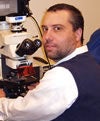
Lysiak, Jeffrey
Primary Appointment
Assistant Professor, Urology
Education
- PhD, University of Western Ontario
Contact Information
PO Box 800422
MR-4, 6153
Telephone: 434-924-5007
Email: jl6n@virginia.edu
Research Interests
Mammalian Spermatogenesis; Erectile dysfunction.
Research Description
My lab has two main areas of interest: 1) Mammalian spermatogenesis specifically mechanisms of germ cell apoptosis and how apoptotic germ cells are recognized and removed by Sertoli cells, and 2) Erectile dysfunction specifically oxidative stress and endothelial cell dysfunction.
1) Spermatogenesis is a complex process where the proliferation/differentiation of germ cells is intimately tied to their apoptosis. It has been estimated that up to 75 percent of the potential numbers of mature spermatozoa are lost due to apoptotic cell death. Studies that modify the apoptotic state of germ cells have demonstrated that apoptosis and subsequent clearance of the dying cells by Sertoli cells are an integral part of cellular homeostasis of the seminiferous epithelium and is essential during development.
How these germ cell corpses are cleared and how this engulfment process links to normal spermatogenesis, are incompletely understood. Our goal is to understand what triggers germ cell apoptosis and how Sertoli cells recognize and engulf these apoptotic germ cells. Understanding the apoptotic and engulfment pathways will provide key insights into mechanisms governing germ cell corpse clearance, and provide a better understanding of this fundamentally important process for spermatogenesis.
2) Erectile dysfunction (ED) is a major health problem currently affecting 30 million men in the United States and this number is expected to double with the aging population. The prevalence of ED increases with age and with chronic disease states such as hypertension, coronary artery disease, and diabetes. While the current pharmacological therapy for ED with oral phosphodiesterase-5 (PDE-5) inhibitors can be effective it is estimated that approximately 50% of individuals do not respond; thus, it is clear that the causative factors for ED should be better understood and those causes prevented. Erectile function is an integrated vascular process that is dependent on interactions between the vascular endothelium, nerves and cavernosal smooth muscle. Nitric oxide (NO) generated from endothelial cell nitric oxide synthase (eNOS) is the principal mediator of this process. Our goal is to understand the vascular biology of ED, with a particular focus on how the endothelium responds to oxidative stress. These investigations promise to advance our understanding and open new treatment options for ED.
